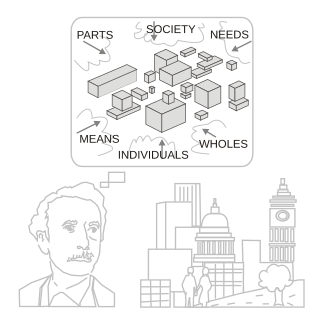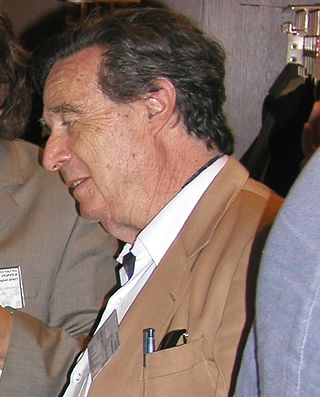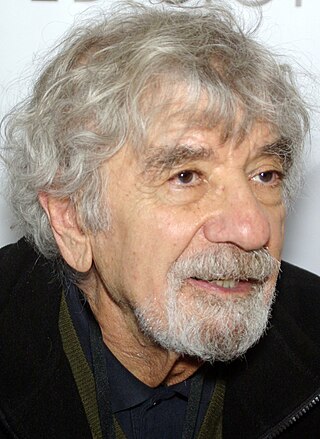In the philosophy of science, protoscience is a research field that has the characteristics of an undeveloped science that may ultimately develop into an established science. Philosophers use protoscience to understand the history of science and distinguish protoscience from science and pseudoscience. The word roots proto- + science indicate first science.
Systems theory is the transdisciplinary study of systems, i.e. cohesive groups of interrelated, interdependent components that can be natural or artificial. Every system has causal boundaries, is influenced by its context, defined by its structure, function and role, and expressed through its relations with other systems. A system is "more than the sum of its parts" by expressing synergy or emergent behavior.

Mario Augusto Bunge was an Argentine-Canadian philosopher and physicist. His philosophical writings combined scientific realism, systemism, materialism, emergentism, and other principles.

The following outline is provided as an overview of and topical guide to academic disciplines:

Constructivism is a view in the philosophy of science that maintains that scientific knowledge is constructed by the scientific community, which seeks to measure and construct models of the natural world. According to constructivists, natural science consists of mental constructs that aim to explain sensory experiences and measurements, and that there is no single valid methodology in science but rather a diversity of useful methods. They also hold that the world is independent of human minds, but knowledge of the world is always a human and social construction. Constructivism opposes the philosophy of objectivism, embracing the belief that human beings can come to know the truth about the natural world not mediated by scientific approximations with different degrees of validity and accuracy.
Critical rationalism is an epistemological philosophy advanced by Karl Popper on the basis that, if a statement cannot be logically deduced, it might nevertheless be possible to logically falsify it. Following Hume, Popper rejected any inductive logic that is ampliative, i.e., any logic that can provide more knowledge than deductive logic. This led Popper to his falsifiability criterion.

Systems science, also referred to as systems research, or, simply, systems, is a transdisciplinary field concerned with understanding systems—from simple to complex—in nature, society, cognition, engineering, technology and science itself. The field is diverse, spanning the formal, natural, social, and applied sciences.
Second-order cybernetics, also known as the cybernetics of cybernetics, is the recursive application of cybernetics to itself and the reflexive practice of cybernetics according to such a critique. It is cybernetics where "the role of the observer is appreciated and acknowledged rather than disguised, as had become traditional in western science". Second-order cybernetics was developed between the late 1960s and mid 1970s by Heinz von Foerster and others, with key inspiration coming from Margaret Mead. Foerster referred to it as "the control of control and the communication of communication" and differentiated first order cybernetics as "the cybernetics of observed systems" and second-order cybernetics as "the cybernetics of observing systems".
Systems philosophy is a discipline aimed at constructing a new philosophy by using systems concepts. The discipline was first described by Ervin Laszlo in his 1972 book Introduction to Systems Philosophy: Toward a New Paradigm of Contemporary Thought. It has been described as the "reorientation of thought and world view ensuing from the introduction of "systems" as a new scientific paradigm".

Joseph Agassi was an Israeli academic with contributions in logic, scientific method, and philosophy. He studied under Karl Popper and taught at the London School of Economics.

Humberto Maturana Romesín was a Chilean biologist and philosopher. Many consider him a member of a group of second-order cybernetics theoreticians such as Heinz von Foerster, Gordon Pask, Herbert Brün and Ernst von Glasersfeld, but in fact he was biologist, scientist.
In science, computing, and engineering, a black box is a system which can be viewed in terms of its inputs and outputs, without any knowledge of its internal workings. Its implementation is "opaque" (black). The term can be used to refer to many inner workings, such as those of a transistor, an engine, an algorithm, the human brain, or an institution or government.

Cybernetics is a field of systems science that studies circular causal systems whose outputs are also inputs, as feedback systems. It is concerned with the principles of circular causal processes, including in ecological, technological, biological, cognitive and social systems and also in the context of practical activities such as designing, learning, and managing.

In sociology, action theory is the theory of social action presented by the American theorist Talcott Parsons.

Alexander Laszlo (*1964) is a polycultural systems scientist, currently residing in Argentina.

Werner Leinfellner was professor of philosophy at the University of Nebraska–Lincoln and at the Vienna University of Technology. After recovering from life-threatening wounds during World War II, he studied chemistry and physics at the Universities of Vienna and Graz, eventually turning to the study of the philosophy of science, and receiving his Ph.D. in 1959. He moved to the United States in 1967, in part, because of problems faced by empirically oriented philosophers in obtaining academic positions in Austria and Germany. He is notable for his contributions to philosophy of science, as a member of European Academy of Sciences and Arts, for founding the journal Theory and Decision, for co-founding Theory and Decision Library, and for co-founding the Austrian Ludwig Wittgenstein Society and International Wittgenstein Symposium.
Viable system theory (VST) concerns cybernetic processes in relation to the development/evolution of dynamical systems: it can be used to explain living systems, which are considered to be complex and adaptive, can learn, and are capable of maintaining an autonomous existence, at least within the confines of their constraints. These attributes involve the maintenance of internal stability through adaptation to changing environments. One can distinguish between two strands such theory: formal systems and principally non-formal system. Formal viable system theory is normally referred to as viability theory, and provides a mathematical approach to explore the dynamics of complex systems set within the context of control theory. In contrast, principally non-formal viable system theory is concerned with descriptive approaches to the study of viability through the processes of control and communication, though these theories may have mathematical descriptions associated with them.
Autonomous agency theory (AAT) is a viable system theory (VST) which models autonomous social complex adaptive systems. It can be used to model the relationship between an agency and its environment(s), and these may include other interactive agencies. The nature of that interaction is determined by both the agency's external and internal attributes and constraints. Internal attributes may include immanent dynamic "self" processes that drive agency change.









